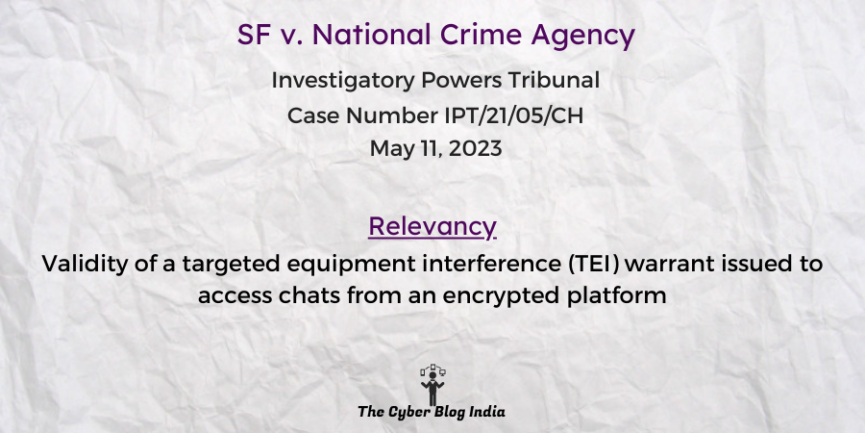SF v. National Crime Agency

SF v. National Crime Agency
UKIPTrib3
In the Investigatory Powers Tribunal
Case Number IPT/21/05/CH
Before Lord Justice Edis, Lady Carmichael, and Mr Stephen Shaw KC
Decided on May 11, 2023
Relevancy of the case: Validity of a targeted equipment interference (TEI) warrant issued to access chats from an encrypted platform
Statutes and Provisions Involved
- The Regulation of Investigatory Powers Act 2000 (Section 65) (“RIPA”)
- The Investigatory Powers Act 2016 (Section 9, 10) (“IPA”)
- The Criminal Justice (European Investigation Order) Regulations 2017 (Regulation 7, 11)
Relevant Facts of the Case
- A joint law enforcement team of France and the Netherlands intercepted EncroChat, an encrypted communications platform.
- There is a dispute about whether the intercepted messages were stored or intercepted during transmission, affecting the required warrants and their legal admissibility in the UK.
- The interception occurred between April 1 and June 11, 2020. The National Crime Agency (“NCA”) sought access to these communications and received a targeted equipment interference (TEI) warrant from the Joint Commissioner (JC) on March 05, 2020. A second TEI warrant, approved on March 26, 2020, replaced the first warrant.
- The claimants, SF and others, have approached the Tribunal seeking to declare these warrants invalid.
Prominent Arguments by the Counsels
The claimant’s counsel argued that:
- NCA failed to fulfil its duty of candour by not fully informing the Judicial Commissioner about its limited knowledge of the interception method and informal communication. NCA had the means to understand the French implant, but they deliberately chose not to do so.
- The Tribunal has the requisite jurisdiction under Section 65(3) of the RIPA. The interception occurred in “challengeable circumstances,” which is within the scope of Part 5 of the IPA.
- NCA needed a targeted interception warrant under Section 15 of the IPA to request foreign authorities intercept a UK-based individual’s communications. Moreover, it should have obtained a bulk interference warrant instead of a TEI warrant.
The respondent’s counsel submitted that:
- NCA contacted a French officer to confirm the existing knowledge for warrant issuance. Additionally, the French agency clarified that it was unwilling to provide information. Hence, it is reasonable for them to proceed with informal assurance.
- The creation of the European Investigation Order (EIO) did not fall under the conduct specified in Section 65(5) of the RIPA, such as those actions requiring or permitting a warrant under Part 5 or Chapter 3 of Part 6.
- NCA’s reliance on the Part 5 warrant is justifiable as requests for mutual assistance instruments fall under the purview of Section 10 for interception-related assistance. Additionally, the TEI warrant was appropriate for targeting the criminal use of EncroChat.
Opinion of the Bench
- NCA fulfilled its duty of candour while seeking approval for the TEI warrant from the Judicial Commissioner. The agency held a three-day meeting with Europol before issuing the warrant, discussing the matter thoroughly. Based on this and available evidence, the Tribunal does not appear to have avoided the inquiries suggested by the claimants.
- The agency did not form a premature opinion in the present case. The French agency was not open to providing the technological details. A warrant was necessary to determine whether France used a lawful interception method, preventing NCA from becoming complicit in illegal activities.
- The relevant conduct did not occur in challengable circumstances. Therefore, the Tribunal does not have the requisite jurisdiction on the claims concerning the legality of the EIO and NCA’s breach of the IPA.
- A targeted interception warrant was not necessary in this case. Section 9 of the IPA is meant to prevent circumvention of Part 2 Regulations by using foreign authorities for UK activities. It does not apply to requests made under EU-related or international mutual assistance agreements governed by Section 10.
- The application process for the TEI warrant issued to NCA to target EncroChat did not contain procedural errors or lack of honesty.
Final Decision
- NCA adequately fulfilled its duty of transparency when seeking approval for the TEI warrant. In this case, NCA is not obligated to obtain a TEI or bulk equipment interference warrant. Furthermore, the Tribunal does not have the jurisdiction to decide on the legality of the EIO.
Jyotsna Sood and Nandita Karan Yadav, undergraduate students at the National Law Institute University, Bhopal, prepared this case summary during their internship with The Cyber Blog India in May/June 2024.
